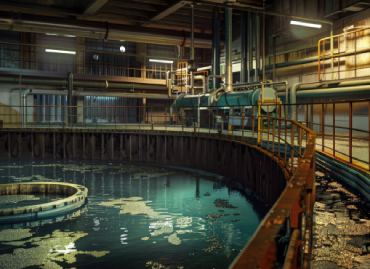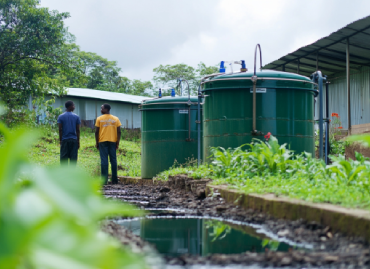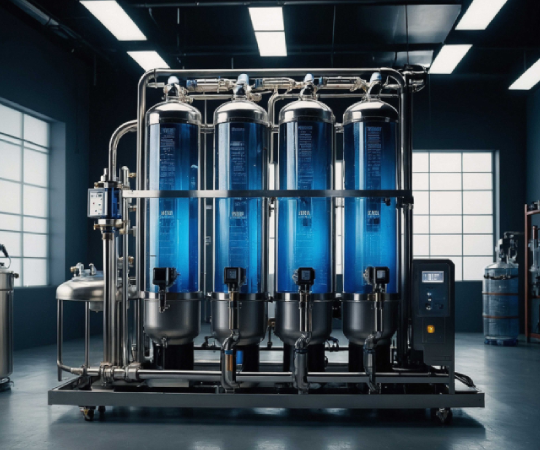- By Admin
- 24 Aug 2025
- ETP Plant
Comprehensive Water and Wastewater Treatment Solutions for Schools, Colleges Using STP, ETP, RO Systems
Educational institutions in India, especially in Maharashtra, have seen rapid growth, with schools, colleges, and universities operating as large communities. Campuses need efficient water management systems to ensure a clean water supply for drinking, sanitation, canteens, and green areas. Water is essential for daily activities in classrooms, laboratories, sports fields, and hostels.
Given the large number of students and staff members on campuses, educational institutions face continuous water demand. From providing safe drinking water through Water Treatment Plants (WTP) or Reverse Osmosis (RO) systems to ensuring water for hygiene and cleanliness in restrooms, kitchens, and science labs, the water needs are diverse. Additionally, maintaining landscapes and gardens also requires significant water usage, making efficient water sourcing and recycling essential.
"Water is the lifeblood of any educational institution, supporting health, learning, and cleanliness. Treating and managing water responsibly not only ensures student well-being but also demonstrates environmental stewardship. Schools and colleges must lead by example through sustainable water usage and wastewater treatment practices."
Sources of Wastewater in Educational Institutions
Water used across different facilities on campus generates a variety of wastewater streams. Major sources include:
>> Sanitation: Toilets and washrooms produce blackwater, which contains organic waste and pathogens.
>> Kitchens: Hostels and canteens produce greywater rich in oils, food waste, and grease.
>> Science Laboratories: Laboratories discharge water containing chemicals, dyes, and other substances, requiring specialised treatment.
>> Cleaning Operations: Janitorial services release wastewater laden with detergents, disinfectants, and debris.
Each of these wastewater streams needs a tailored treatment approach to ensure that it can be safely disposed of or reused without harming the environment.


Treatment of Wastewater
The major types of wastewater on educational campuses include blackwater (from toilets), greywater (from showers, washbasins), and chemical waste (from science labs). To ensure that wastewater is treated efficiently, educational institutions often install Sewage Treatment Plants (STPs) and Effluent Treatment Plants (ETPs).
>> STPs: These systems are used to treat blackwater and greywater generated from toilets, kitchens, and washing areas. Biological treatment methods such as Moving Bed Biofilm Reactor (MBBR) or Sequencing Batch Reactor (SBR) are often used for this purpose, followed by tertiary filtration to ensure that water is safe for reuse.
>> ETPs: For wastewater from laboratories and kitchens that may contain oils, chemicals, or other hazardous substances, ETPs are employed. These systems can use mechanical, chemical, and biological treatment methods to remove contaminants.
The treated water can then be safely reused for non-potable applications like landscape irrigation, toilet flushing, or cooling systems, reducing the overall water demand and helping to meet environmental regulations.
Smart Wastewater Treatment for Water Reuse
Many schools and colleges are adopting advanced wastewater treatment technologies to achieve greater sustainability. MBBR, SBR, and RO systems help improve water quality and allow safe reuse for a variety of campus needs. Water recycling for flushing, irrigation, and HVAC systems reduces reliance on fresh water and operational costs. For example, schools with green campus initiatives use treated wastewater for landscaping, promoting water conservation and cost savings.
Additionally, automation and IoT-based monitoring systems are increasingly being integrated into water treatment facilities on campuses. These systems provide real-time data, enabling schools and colleges to monitor water quality, control processes, and optimise treatment operations. This leads to better resource management and ensures compliance with regulatory standards.
Tailored Water Treatment Solutions for Educational Institutions
Our company offers custom-designed STPs, ETPs, WTPs, and RO systems tailored to the unique needs of educational institutions. Whether it is a small school or a large university, we provide space-efficient, modular solutions that fit within the constraints of the campus.
>>Our services include:
>> System Design and Installation: We offer complete design and installation services for STPs, ETPs, WTPs, and RO plants, ensuring efficient water management and wastewater treatment.
>> After-Sales Support and AMC: We provide Annual Maintenance Contracts (AMC) and regular system inspections to ensure long-term performance.
>> Training and Retrofitting: Our team also helps with the retrofitting of existing systems and training staff to operate and maintain water treatment plants efficiently.
These solutions help educational institutions meet local environmental regulations while lowering water costs and promoting sustainability. With a focus on reducing water wastage and enhancing the reuse of treated water, schools and colleges can lead by example in promoting environmental stewardship.
Summary And Conclusion
Educational institutions, with their high water demand and wastewater production, must adopt effective water and wastewater treatment solutions to ensure sustainability. Sewage Treatment Plants (STPs), Effluent Treatment Plants (ETPs), and Reverse Osmosis (RO) systems are critical in managing water quality and promoting water reuse. With automated systems and smart technologies, campuses can minimise freshwater dependency, reduce costs, and meet regulatory standards. Our tailored water treatment solutions, including modular and space-efficient designs, help schools and colleges contribute to environmental conservation while ensuring a clean and safe campus environment.































































